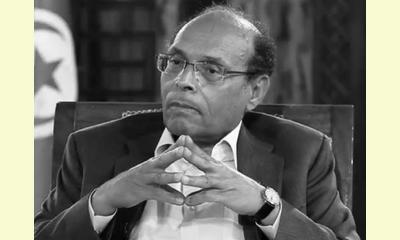|
|
Shukran, Mister President, Thank you!
un article par Kiki Chauvin
The newspaper "Les Echos" gave it the headline
"The incredible speech of Tunisian President
Moncef Marzouki", and almost all media applauded
the authentic and moving delivery of his message to the European Parliament on 6 February.

click on photo to enlarge
It is not often that we are privileged to hear a
political speaker with force and simplicity, and
such a call for democracy! Instead of vague words,
his discourse is infused with humanism to an extent
we rarely encounter!
I was especially touched by the elegance with
which he developed his presentation, with clarity,
precision and relevance, without ever getting
lost. Political imprisonment, house arrest, long
years of exile did not taint the quality of his
analysis. By asking the parliamentarians for
empathy, he orients the debate towards listening
and understanding.
He poses the fundamental question with great
honesty: What are the real threats to the Arab
revolutions? Danger, or progress? In developing
a democratic system can we convert and integrate
those who are "undemocratic"? Between
secularists and Islamists, how can we compose
political parties, respecting their diversity?
The clarity of his perspective leads him to defend
all freedoms, starting with the achievements of
women, and the guarantee of modernity.
I read with great interest the final part of the
speech where he discussed relations between East and
West, especially human exchanges on the basis of
equality..
Recalling history, the Greek past, Judeo-Christian
and Muslim "painful shared history of colonization
and crusades" he offers a different perspective of
mutual tolerance and openness to a future more
intelligent.
Whatever his spiritual beliefs may be, he speaks as
a free man, a secular citizen of the world. And when
he makes his appeal for peace in the Middle East, he
denounces the culture of war and speaks in favor of
a culture of peace!
In his speech we meet two of his friends who are no longer with us: the mentor of his thesis, Dr. Marc Klein, Jewish and deported, to whom he owes his consciousness and his first contact with the Universal Declaration of Human Rights; and Chokri Belaid, Tunisian lawyer and politician deeply involved, who had been assassinated in Tunis that very day.
Yes! "Shukran" [Thank you!] for your courage, Mr. President. You are like the warm wind that blows towards us from across the Mediterranean, "el Ghibli", the sirocco. You are able to move the dunes of sand, without hurting men ... You are more than a talented speaker, you are a politician who puts mankind at the center of our concerns.
Wa-alaikum salaam! Peace be with you, my brother.
(This article is continued in the discussionboard.)
( Click here for the original French version.)
|








|
DISCUSSION
Question(s) liée(s) à cet article:
The Arab spring of 2011 , Can it inspire democratic movements around the world?
* * * * *
Commentaire le plus récent:
(The following is continued from the main article listed above.)
Remarks on the Arab Revolutions by Moncef Marzouki (translated by CPNN):
In the late 90s, I wrote that if the 18th century was the century of the French Revolution and the American, the 20th one of the Russian revolution and Chinese, the 21st century will be the century of the Arab revolution. This did not come from reading in coffee shops, but in the books of history.
Great nations do not commit suicide nor let themselves die. Deep within themselves they manage to find, when all seems lost, an energy to rebound. The longer the ordeal, the deeper the fall, the greater the energy that will enable them to rebound from the depths to which they have fallen. The Arab revolutions, according to this inevitability of history, have now finally arrived. . .
There is nothing to fear of the Arab revolutions, because they are not nationalist and xenophobic revolutions. . ... continuation.

|
|









